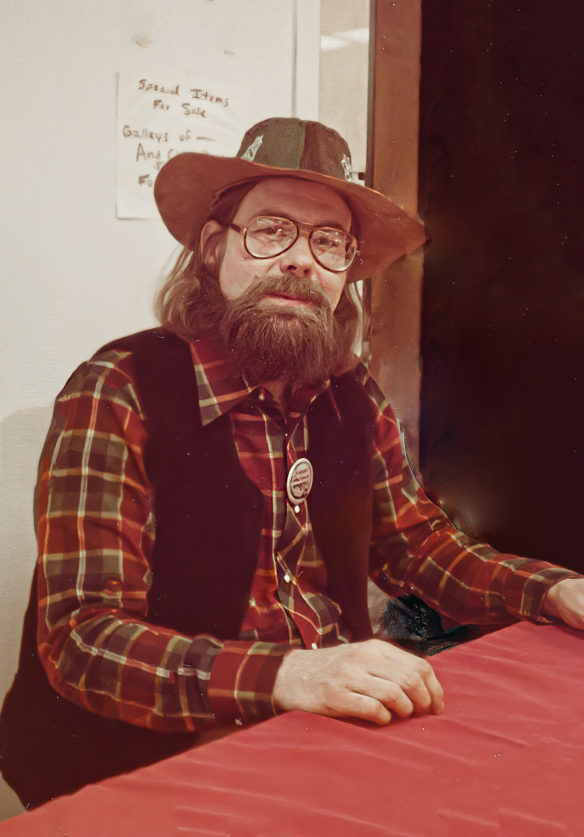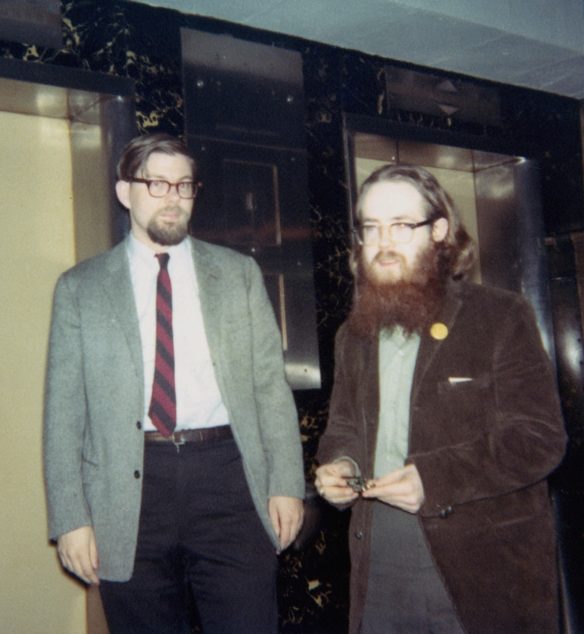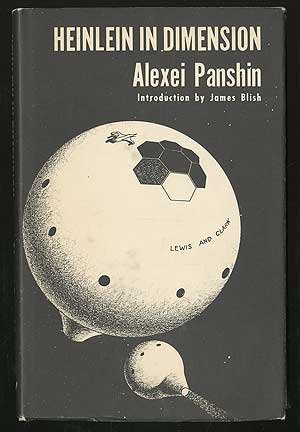
Pioneering sf critic and Nebula-winning novelist Alexei Panshin died August 21 at the age of 82. His son Tobiah Panshin made the announcement on Facebook.
Alexei suffered a sudden cardiac arrest on Wednesday. He passed away today, peacefully.
He had many sayings he liked to quote to me, most of which he made up himself. A common one was, “How can we sink, when we can fly?”
If any part of him persists in the infinite reaches of this universe, I suspect that he is flying now.
Condolences or well-wishes to our family may be sent to [email protected]
Panshin was hooked on science fiction at the age of 10, thanks to the Boys’ Life serialization of Robert Heinlein’s Farmer in the Sky. After receiving a typewriter as a high school graduation present in 1958 he began teaching himself how write science fiction stories, and from then on thought of himself as a writer and not just another science fiction reader.
Panshin’s first fiction sale in the late Fifties would actually be a non-sf story to Seventeen magazine, “A Piece of Pie”, written during his time attending the University of Michigan. But in Ann Arbor he also connected with sf author Dean McLaughlin at a college bookstore, and started picking his brains relentlessly for whatever he could tell him about the science fiction writing world. McLaughlin soon introduced him to the leaders of the forthcoming 1959 Worldcon in Detroit. Panshin attended and began to make connections with other pro writers, whose ranks he aspired to join. He even bought an hour of time from the convention’s Guest of Honor Poul Anderson at auction for $25, and talked to him about his ambitions. Later in the fall he met Harlan Ellison at a pro party, whose words were less encouraging. Wrote Panshin: “When Harlan and I were introduced, he fingered my blazer on which I had spent no less than $20, and said: ‘So you want to be a writer. The first check you get, ditch this and buy yourself a continental cut suit.’ He didn’t know me very well. I haven’t owned a suit to this day, continental cut or otherwise.”

A confirmed fan of Robert A. Heinlein, he wrote him a fan letter in 1948 and was excited to get a postcard in reply.
Later Panshin was inspired to do a deep analysis of Heinlein’s work that would make science fiction history in several ways. Having seen Panshin’s sercon articles in the Hugo-winning fanzine Yandro, Earl Kemp invited him to write a book about Heinlein for Advent:Publishers.
Robert Heinlein didn’t answer the letter Panshin sent him when he was researching the book. Instead, Heinlein wrote to publisher Earl Kemp threatening to sue Advent and Panshin if it came out. Advent immediately withdrew the book from its plans. Panshin turned around and wrote a piece for Yandro entitled “Lese Majesty”—”an offense against the King”—setting forth the situation. As a result, throughout 1966 Heinlein in Dimension would appear in pieces in four different fanzines. (The complete Heinlein in Dimension has been posted by the author at the link.)
The fanzine appearances of Heinlein in Dimension made Panshin eligible for the very first Best Fan Writer Hugo, presented at NYCon 3 in New York in 1967. He won. That year Advent’s publishers also changed their minds and signed him to a contract for Heinlein in Dimension which appeared in 1968.
In 1968 Panshin again got enough votes to be a Best Fan Writer finalist but was granted his request to have his name removed from the ballot. “I thought someone else should win the next one, and hoped to set a precedent by saying that one was enough.” Besides which, in 1968 Harlan Ellison had also withdrawn as a Best Fan Writer nominee because he wanted to be identified solely as a pro.
And in 1968 Panshin had two new novels published, Star Well, first of the Anthony Villiers books, and Rite of Passage, which would win the 1969 Nebula for Best Novel. (Not that it was as easy as it sounds. Rite of Passage was rejected 13 times before Terry Carr accepted it for his new Ace Specials line.)
That year he also was one of the signers of the famous 1968 Galaxy Vietnam War ad – on the antiwar side, of course.
There would eventually be three published books in the Villiers series — Star Well, The Thurb Revolution, and Masque World. A fourth volume entitled The Universal Pantograph, never appeared, reputedly because of conflicts between the writer and his publisher, joining the list of works in a series that fans await for years and speak of longingly, usually to be disappointed. (A rare exception being the Demon Princes series which Jack Vance eventually finished).
A byproduct of the Villiers series was Larry Niven’s admiration for the term “thumbrunner” which Panshin coined for one of the books. Niven wished he had thought of it first, regarding it as far superior to the word he made up for his own stories about “organleggers”.
Panshin and Cory Seidman married in 1969. In the Seventies and Eighties, the Panshins would work together both on fiction – Earth Magic (1978) – and two major sf critical books, SF in Dimension (1976) and The World Beyond The Hill: Science Fiction and the Quest for Transcendence (1989), which received a Hugo Award for Best Related Work. As Alexei said in his autobiography, “It may tell you something about us that our initial wedding present to ourselves was the acquisition of the four-volume boxed set of Joseph Campbell’s The Masks of God.”
Panshin is survived by his wife, Cory, and sons, Adam and Tobiah.
A great many of the author’s personal essays and critical articles are collected at his website The Abyss of Wonder.


Update 08/22/2022: First two paragraphs substantially revised.
Discover more from File 770
Subscribe to get the latest posts sent to your email.

May his memory be a blessing and a continuing inspiration to his family, friends and readers all over the world…AD ASTRA!
As one of the fen waiting for the Universal Pantograph, I guess I’ll have to wait, or write it myself.
His writing was wonderful, and thoughtful, and caring. We’ve lost another someone important.
It’s extraordinary that Star Well and Rite of Passage were published in the same year.
Requiescat in pace. I really enjoyed Heinlein in Dimension, and Rite of Passage.
Heinlein in Dimension and Rite of Passage were wonderful, and the Athony Villiers books were fun even though we never got The Universal Pantograph.
I am sorry. Really liked him. I AM glad he had an easy passing. But I’ll still miss him. Rite of Passage was my personal favorite.
I first read Rite of Passage in a college class way back when. A great read with a great professor leading great class discussion. I’ve always remembered it. Lovely book with important things to say. Of course I read more by Alexi Panshin after that. Wonderful writer.
RIP Alexei Panshin, someone I always wish I had met. His story, “How can we sink when we can fly?” from Four Futures (1971) was reprinted in Dream’s Edge (1980), edited by Terry Carr. In his paragraph introducing the story, Carr wrote: “Sometimes it’s impossible for a conscientious science fiction writer to produce a hopeful picture of the future in view of the number of serious problems we face and the fact that we’re doing far too little about them. Alexei Panshin found himself in this difficult position. After much thought he produced the following ingeniously constructed story-within-a-story, in which his auctorial dilemma, the problems of our world, and the solution to both finally come together. The operative word is faith.”
Panshin’s life as an author, scholar, and man of faith certainly inspired me. Condolences to all his friends and family.
I admired both his fiction and his criticism and was honored by his friendship. I am one of many who will miss him greatly.
Going to be a need for a bit of diplomacy by Misters Clemons and Burton on the Riverworld.
Ad Astra, Mr. Panshin! I enjoyed our Facebook conversations. My condolences to your family.
“The Universal Pixelscroll.”
Thurb.
Along with thumbrunner, drapeau is a perfectly self-explanatory word.
Your timeline on the history of Advent:Publishers is off. According to the Wikipedia article about it, it started in1955—way before Panshin would have been offered the opportunity for a book about Heinlein.
Alexei, btw, lived near me on Joralemon Street in Brooklyn Heights, NYC, briefly during the 1970s.
Andrew I. Porter: Ah. Fixed that. Always a bad idea not to fact-check my memory.
A good man, a fine writer. He was an Important Figure in the sf/f world when I first entered it and he was always very kind to me and all of the members of the newly- formed Pittsburgh Fan Club. My sympathy to Cory and his sons.
Minor correction —. Ted Sturgeon was GOH at Chicago in ‘62. Poul Anderson was GOH at Detention in ‘59.
I met Alexei and Cory at a convention. I can’t say I really knew him, or her, nor was I a friend. I wish I had been. I enjoyed his writing. I enjoyed his thinking. I enjoyed what conclusions he put his thinking to. Very recently Facebook started sending posts of his, daily, or nearly so, although we had been Facebook friends for years. I may have gotten an occasional post before. I was getting beautiful pictures of a variety of subjects in nature. I reposted them all. I will miss him, even as a distant admirer. He made a positive contribution to the world with his life, and art.
The reason Heinlein objected to Panshin writing HEINLEIN IN DIMENSION was the publication of a Panshin article on Heinlein which appeared in the mid-’60s in SHAGGY (the LASFS clubzine) which editor Redd Boggs had retitled “Heinlein By His Jockstrap.” Heinlein was offended by that title,
You also omitted his column of critical essays which appeared in my FANTASTIC during the ’70s, which was the building blocks for his later massive book of SF criticism. I also published a fantasy novel by Alexei in FANTASTIC — the only one we ever serialized in three (rather than two) parts. Alexei wrote it as I published it, turning in the second and third installments shortly before deadlines. I’ never did this for any other author, but I wanted the novel written and I knew this was the only way.
Alexei was a good friend and he will be much missed.
Ted White: Mention anything you want to spotlight, certainly. However, the Shaggy article is just one of three reasons Panshin gives for Heinlein’s objection. Another was an exchange they had in personal correspondence over Heinlein’s support for atmospheric nuclear testing reflected in the Patrick Henry League ad, where Panshin raised the issue of the risk of Strontium 90. Heinlein also complained that Advent hadn’t chosen a more established critic.
If by “omitted” you mean I should have put it in, I was curating potentially thousands of words of information while aiming to complete the obituary within the same day his death was announced. Among everything available to choose, the last thing I considered including that didn’t go in was his work in the Seventies bringing to SFWA’s attention that Ace was failing to pay out a huge amount of owed royalties. In the end, Ace paid out “no less than half a million dollars” according to Panshin.
Is that really Alexei in the first picture or is it Mike?
(1) Porter says it’s a photo he took of Panshin. (2) Panshin’s appearance changed by the Seventies. Compare with this photo from the 1971 Worldcon — https://fanac.org/photohtm.php?worldcon/Noreascon/w71-026.
Hm. Andy remarked on the Trufen mailing list today that
“Obit in file 770, confuses Alxei with Mike McInerney in one of my photos.”
That first one looks more like Mike than Alexei to me. But maybe Andy was referring to the second photo and you already changed the L/R caption (?)
Alexei in the ’70s ….
https://scontent-sjc3-1.xx.fbcdn.net/v/t1.18169-9/61376_104962049566273_2388024_n.jpg?_nc_cat=111&ccb=1-7&_nc_sid=09cbfe&_nc_ohc=ylg63uLnsREAX-HCNp_&_nc_ht=scontent-sjc3-1.xx&oh=00_AT81BFoH8xMBfqgUjEcQWmJj3RD40DMK7qtx6vDAoWfPDQ&oe=63298827
Lenny Bailes: It’s the second photo (from 1966) that I had to correct. And yes, I made the correction earlier today, probably before you checked it out.
A major source of Heinlein’s unhappiness was the correspondence that Alexi had obtained from the widow of a friend of Heinlein. Somewhere I have a copy of the Heinlein letter that was sent to the Advent partners that referred to the issue.
From the amount of songs on his website, I thought he was a filker, but can’t find any specific mention anywhere; am I wrong?
Panshin was one of the few writers I ever, in my foolish, enthusiastic youth, seriously considered bothering with a fan letter – his website was remarkable, even at the turn of the century (I really should finally finish Meeting Ahmed Again). I still remember how I read Rite of Passage, the best way it could be, when I was 20, in a bus returning from a successful con. (A pity there’s no attempt to explain in the article what made his books so great). Not long after, I mentioned it to a new publisher looking for recommendations. The translation was botched, and the book sank without a trace. Hi ho. I should have tried to do something about Star Well.
Also, the Czech National Library used to have a copy of The World Beyond the Hill in the reference shelves of its huge Baroque reading room. I would stop by and browse for a couple pages, never finding the time to read it properly. In some reorganization or reconstruction over a decade ago, they pulled it back to depositories.
Another giant of my youth gone. Good flying above the abyss, sweet prince.
As I belatedly noted in a separate comment that seems to have been lost in moderation, “he wrote [Heinlein] a fan letter in 1948 and [… got] a postcard in reply” is an obvious mistake – the eight-year old Alexei would have to have been EXTREMELY precocious, both as a writer and a reader.
In his “imaginal autobiography” Following My Nose (rather not linking this time), he makes it unambiguous that the exchange took place in 1956.
Pingback: AMAZING NEWS FROM FANDOM: 8/29/22 - Amazing Stories